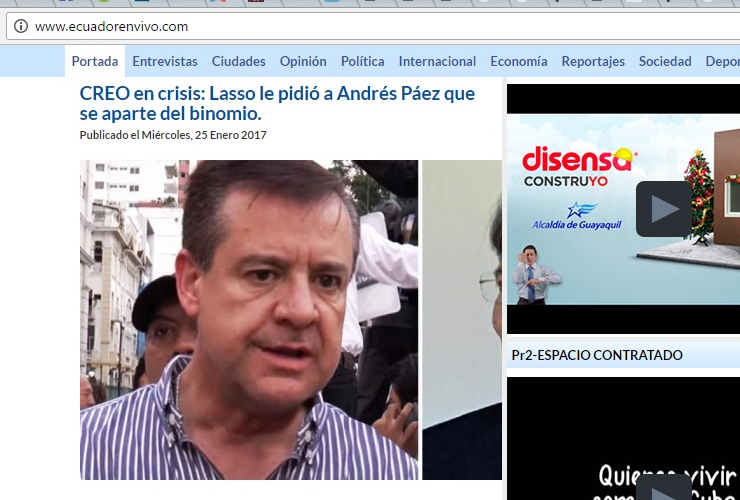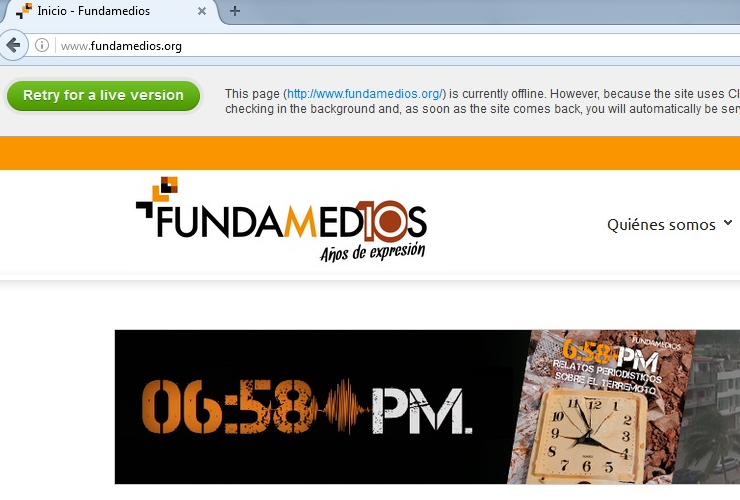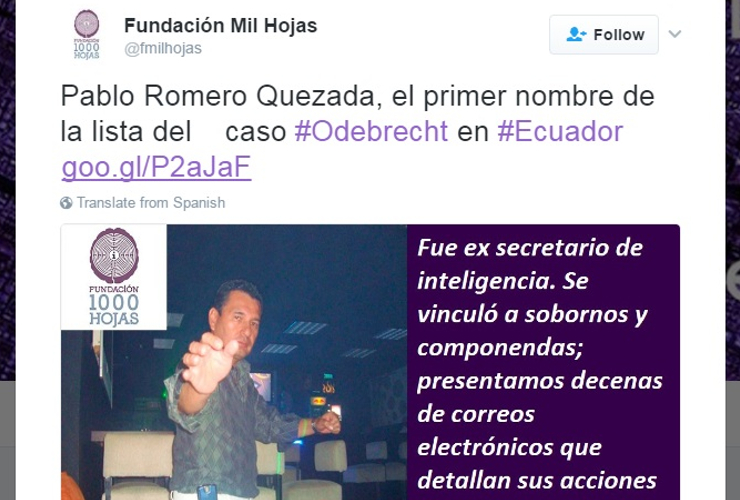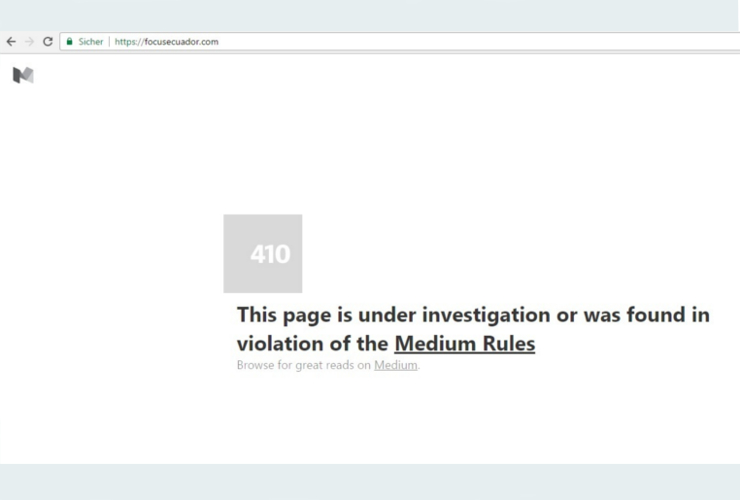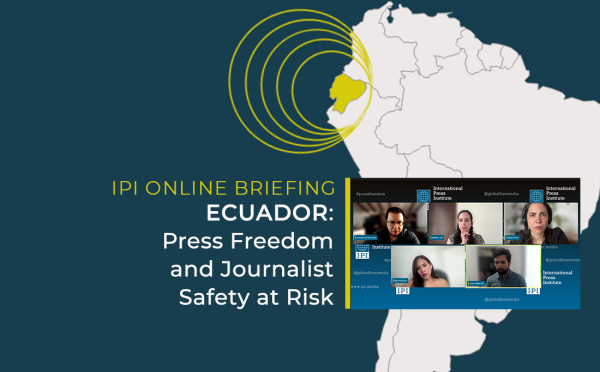Lea esta noticia en español.
Ecuador’s restrictive communications laws have limited investigative journalism to news websites constantly struggling amid precarious economic circumstances, so the takedown of five online media outlets in less than 72 hours following numerous digital attacks represents a troubling development.
The incidents have come ahead of a presidential election set for Feb. 19, where Lenin Moreno, a former vice president under incumbent Rafael Correa and the candidate of Correa’s Alianza País party, and main opposition CREO party candidate Guillermo Lasso lead in the polls.
In some cases, the attacks occurred just minutes after the portals published news of the alleged involvement of members of Ecuador’s government in a corruption scandal affecting several Latin American countries.
Investigative news website MilHojas.is was one of the first to fall. On Jan. 24, the website was inaccessible for a few hours as the result of a Distributed Denial of Service (DDoS) attack.
MilHojas Executive Director Martha Roldós told IPI the attack coincided with the release of a news story revealing alleged links between the former secretary general of Ecuador’s intelligence service, Pablo Romero Quezada and a corruption scandal in which Brazilian construction company Odebrecht is accused of bribing government officials around the world. The story also linked Romero Quezada to HackingTeam, a private Italian company that reportedly sold mass surveillance technology to Ecuador, among numerous others.
The next day, several other news portals suffered similar attacks on their infrastructure. Press freedom NGO Fundamedios was the first to raise the alarm. Ecuadorchequea.com, a fact-checking online media monitoring presidential candidates’ speeches, and digital radio station Rayuelaradio also found their sites offline for hours.
However, Ecuadorenvivo.com suffered a more sophisticated attack. After taking control of the site, hackers published fabricated content smearing Lasso, the opposition party candidate.
“This is the second serious attack we have suffered in the last 10 days,” Ecuadorenvivo.com Director Alfonso Pérez said. “In the previous attack, they managed to erase the information we had published the previous four months.”
Communication Law
Ecuador’s Communication Law has drawn widespread criticism from international watchdogs, including the International Press Institute (IPI), for narrowly defining freedom of expression, over-regulating media content and giving excessive powers to media regulators. IPI Director of Advocacy and Communications Steven M. Ellis said that the law’s “restrictive interpretation and overwhelming fines are highly likely to lead to self-censorship”.
Online news portals are not subject to the law, leaving them free to play an “essential” role in modern Ecuador, Fundamedios Director César Ricaurte told IPI.
“Given the limitations for traditional media imposed by the Communication Law, a large part of the investigative reporting, especially on corruption, has been published on online media outlets,” he explained.
But the sites are still economically vulnerable and attacks and interference have an immediate economic impact.
“We are small media outlets that must devote many resources to digital security to the detriment of our own journalistic work,” Roldós said.
The journalist, whose website was offline for three days in 2015 when it suffered a similar attack after publishing a report on mass surveillance technology Ecuador’s government allegedly bought from HackingTeam, recounted: “The time and resources these attacks consume is enormous. They paralyze you, slow you down, take away the time that you should spend investigating.”
Pérez similarly described a significant reduction in ad revenue due to the attacks.
“In addition to that, the staff is left with nothing to do for two or three days [until control of the site is regained],” he told IPI. “As you can understand, this is an unexpected loss both in terms of news deliverables and ad revenue”.
But, Pérez added, despite the difficulties, the targeted online media outlets usually stand together in solidarity.
“When the website of one of us is down, the others tend to republish the controversial articles that might have been the reason behind the digital attack,” he commented.
U.S. Copyright Law
Even when news sites are not confronted with direct online attacks, they have faced other actions intended to hinder their work.
Ecuador’s unique use of copyright law to silence government critics has already drawn condemnation from several international organizations, such as the Electronic Frontier Foundation (EFF), Human Rights Watch (HRW) and the Committee to Protect Journalists (CPJ).
Correa reportedly has spent some €4.4 million on intellectual property claims to remove critical news reports, videos and posts from social media platforms. The claims are based on the 1998 U.S. Digital Millennial Copyright Act (DMCA), which has an impact on content posted around the world given that so many social media platforms are headquartered on U.S. soil.
FocusEcuador.com, a government critic, is currently hosted on the blogging platform Medium.com after having been forced to change their hosting and domain up to four times in the last two years due to attacks and interference. But the site currently cannot be accessed.
“As of today, we have been offline for 10 days accused of copyright infringement according to the claims submitted by [Ecuadorian] government sources,” Marlon Puertas, a collaborator with FocusEcuador.com, explained.
The complaint to Medium.com about the alleged copyright infringement coincided with FocusEcuador.com’s publication of an article titled ‘Fraude a la vista’, which Puertas said detailed charges of alleged political manoeuvring to control Ecuador’s National Electoral Council, the independent body overseeing transparency and fairness in presidential elections.
“In order to document the story, we used photographs of public figures obtained from the government’s official websites,” Puertas told IPI. He assured that “the photographs were duly credited”.
For now, FocusEcuador.com’s administrators are in contact with Medium.com to bring the website back online, a process Puertas described as “quite long and cumbersome”.
There is not much optimism among online news outlets in Ecuador that change will come soon. Digital attacks are difficult to trace back to the source, as they often use “deep web” encrypted channels, and news sites have no direct proof linking government officials to attacks.
“Obviously, we cannot point to them beyond the fact that having our website blocked benefits their interests,” Roldós said.
Her colleague Ricaurte added that the attacks “will continue as long as the current political situation persists”. He added: “If there is a change of power in the February 19 Presidential Elections, the climate for online and traditional journalism may improve.”

